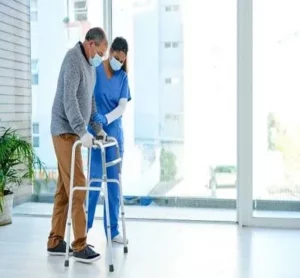We do not request reimbursement of costs
(such as repayment for obtaining medical records)
from veterans nor from people who suffer from multiple sclerosis.
- Call today for a free evaluation
- 1-888-774-7243
Disability for COVID
Disability Benefits For Long Covid
Profound fatigue, damaged lungs, and crippling brain fog. These are among the many symptoms people have experienced weeks or months after contracting covid-19.
Often called “long covid,” the not-well understood condition has left tens of thousands of healthy Americans disabled. More than 20 million Americans have symptoms of long covid and have experienced according to the American Academy of Physical Medicine and Rehabilitation estimate that assumes 30% of covid-19 infections result in long covid.
 Given this scale, the Social Security disability adjudication system has never faced such a mass crippling disease in its history. This has led to the question: If a person is unable to work because of covid-19, can they collect disability for covid?
Given this scale, the Social Security disability adjudication system has never faced such a mass crippling disease in its history. This has led to the question: If a person is unable to work because of covid-19, can they collect disability for covid?
In most cases, simply having covid-19 is not enough to qualify for Social Security disability, but those who become unable to work for longer than a year may have a path to file a successful SSD claim. There are, however, many challenges with these types of claims.
Because the Social Security Administration (SSA), the agency that oversees disability claims, has not issued formal guidance on long covid, this article will examine how the agency may proceed with disability claims for covid. This, of course, is based on our analysis and decades of experience with how SSA functioned in similar situations.
What is long Covid?
You may have heard the term “long covid” or “long haulers” to describe people and symptoms of covid-19 that last for weeks or months after a person contracts the disease. Unlike other diseases and conditions, long covid is difficult to prove because it often cannot be diagnosed with a single medical test.
The symptoms also can widely range. Many of the common and debilitating traits of long covid include trouble breathing, frequent and severe headaches, brain fog or trouble concentrating, organ damage, dizziness cough, and more, according to the U.S. Centers for Disease Control and Prevention.
When is Social Security Disability awarded for COVID-19?
Social Security disability, or SSD, benefits are generally awarded when a person has a disabling condition that doesn’t improve within a year and leaves them unable to earn an income. Because of that requirement, there is no “short-term” disability that can be offered through the U.S. Social Security Administration, the administration that oversees disability claims.
So, when it comes to covid cases, even if a person has become severely ill but has returned to work within 12 months, they won’t be eligible for SSD benefits.
How do I qualify for Disability for Covid?
For people who become disabled because of long covid or have suffered from COVID-19 disability, establishing a record of symptoms is crucial for a successful SSD claim. That is why visiting with a doctor early and often is vital to building a successful disability claim.
This could include telling your doctor if you have difficulty breathing after regular physical activity or suffer from migraine headaches that make working impossible. Letting a doctor know the frequency and severity is vital for a successful SSD claim. It also can inform you what the recovery process may look like.
Another reality of the SSA’s disability adjudication system is that patients must also seek active treatment for their disability. This sometimes leads to claimants undergoing treatments or therapies that may seem useless.
Active treatment might be difficult for long-haulers since the effects of covid-19 are poorly understood. There is also no specific treatment for the condition. Nevertheless, it is absolutely necessary to consistently seek out treatment regardless if it provides any benefit toward your recovery.
Should I Hire a Lawyer for my covid-19 Disability Claim?
If you or a family member suffered from long covid, hiring an experienced disability lawyer can help you build a strong case for SSD benefits. Given how new these types of claims are becoming, a social security attorney in new jersey can help guide you through the process.
At Chermol and Fishman, LLC, our experienced and caring attorneys are here to assist you during this difficult time and help you collect the maximum benefits you qualify for.
Contact us today to schedule a free and no-risk consultation if you’ve experienced lasting symptoms of covid-19 or any other disability.
For a Free Evaluation
Monday : 9am–5pm
Tuesday : 9am–5pm
Wednesday : 9am–5pm
Thursday : 9am–5pm
Friday : 9am–5pm
Saturday : Closed
Sunday :Closed

